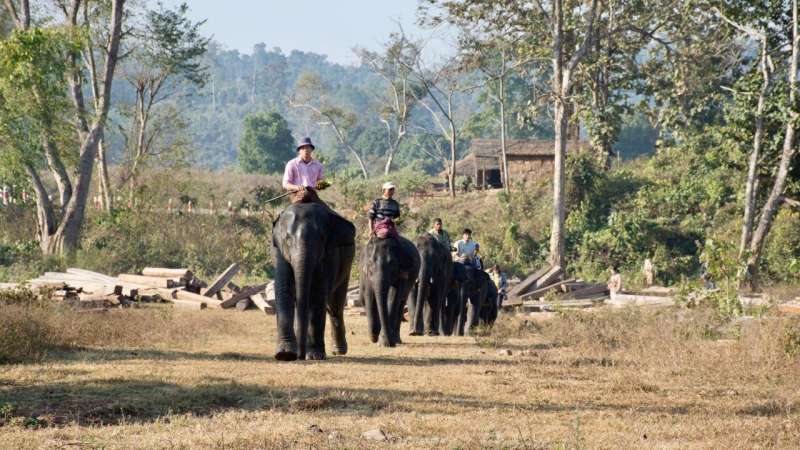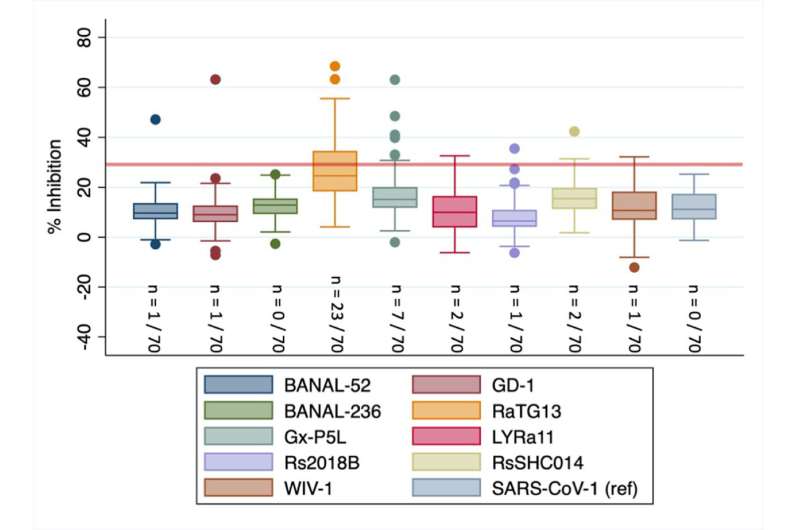This article has been reviewed according to Science X's editorial process and policies. Editors have highlighted the following attributes while ensuring the content's credibility:
fact-checked
peer-reviewed publication
trusted source
proofread
Study finds bat-borne sarbecoviruses spilled over in Southeast Asia pre-pandemic

A virus previously found only in bats was detected in the antibodies of people screened for exposure to sarbecoviruses between 2017 and 2020 in rural Myanmar in Southeast Asia, according to a study from the University of California, Davis and collaborators in Myanmar and Singapore. The work is published in the International Journal of Infectious Diseases.
Sarbecoviruses are a group of coronaviruses. This study found exposure to diverse sarbecoviruses, including some known to be closely related to SARS-CoV-2, such as RaTG13.
The study found that people were significantly more likely to have been exposed to sarbecoviruses if their livelihood involved working directly with or close to bats, such as logging, hunting or harvesting bat guano.
"This study provides new evidence that bat-borne coronaviruses can and do spill over to people, underscoring the importance of surveillance in high-risk rural areas, where humans and wildlife closely interact," said lead author Tierra Smiley Evans, an epidemiologist and research faculty with the One Health Institute in the UC Davis School of Veterinary Medicine.

Reconnaissance work
Partnering with local clinics in Myanmar, the study's scientists screened nearly 700 people for sarbecoviruses between July 2017 and February 2020, before the first reported case of SARS-CoV-2 in Myanmar. They did not detect any active infections. However, 12% of study participants had antibodies in their system indicating they had been exposed to a sarbecovirus in their past.
While both rural and urban residents were tested, only people from rural areas had been exposed, and most of them worked in forested areas and extractive industries, such as mining, logging or hunting. This suggests that newly disturbed, biodiverse environments can increase the risk of wildlife-to-human transmission of viruses.
No wildlife were sampled for the study. Instead, people seeking treatment for fever in rural and urban clinics were enrolled in the surveillance studies, as were patients from clinics near local elephant logging camps. In Myanmar, the traditional method of using elephants to harvest timber is still practiced, so a network of temporary logging villages dots the forest edges. Samples were also collected from healthy people living in regions believed to have high levels of contact with bats.
"It's like reconnaissance work," Smiley Evans said. "We get an idea of what's in the forest by looking at what people have been exposed to, without even going into the forest."
The study provides epidemiologic and immunologic evidence that zoonotic spillover is occurring.
"Our findings underpin the critical importance of continued surveillance at the rural wildlife-human interface in Southeast Asia, where some of the highest levels of known mammalian diversity exist and where future emergence of zoonotic diseases is likely," the study said.
More information: Tierra Smiley Evans et al, Exposure to diverse sarbecoviruses indicates frequent zoonotic spillover in human communities interacting with wildlife, International Journal of Infectious Diseases (2023). DOI: 10.1016/j.ijid.2023.02.015




















